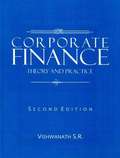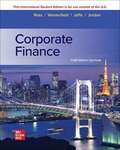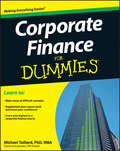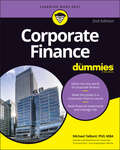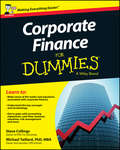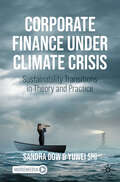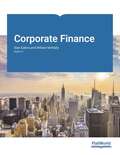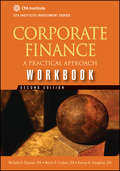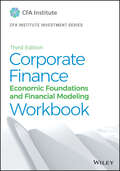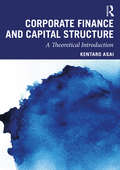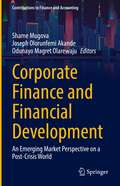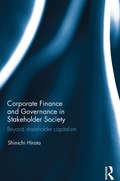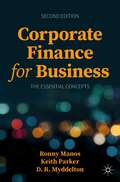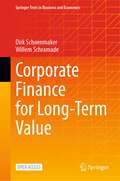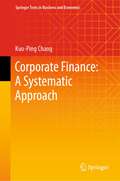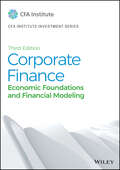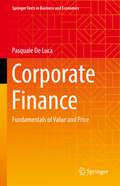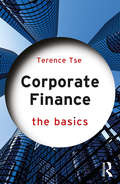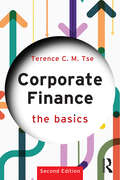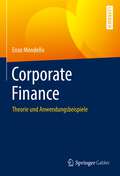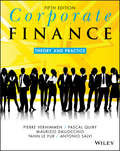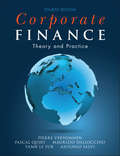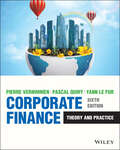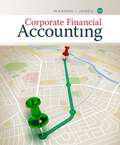- Table View
- List View
Corporate Finance
by S R VishwanathThis--revised and enhanced--book examines the role of finance in supporting other functional areas while fostering an understanding of how financial decisions can create value. Corporate Finance covers areas related to estimating divisional cost of capital; executing a financing strategy; establishing debt and dividend policies consistent with the company`s strategy and environment; choosing between dividends and stock repurchases; managing high growth and managing working capital. Its new topics include: - Corporate Financial Flexibility (Real options) - New Financial Instruments - Project Finance - Acquisitions and Control - Performance Measurement and Incentive Compensation The goal of this book is to provide a thorough understanding of how and why firms make their financial decisions the way they do and their impact on shareholder value. The central theme of the book is Value Based Management, which assumes that maximizing shareholder value is the governing objective of a firm. Each chapter of this new edition has detailed and real-life cases to help students easily understand and grasp concepts. The author has also provided the case-map of the Harvard Business School to make this book more user-friendly in classrooms. The inclusion of several new topics/cases, extensive pedagogical tools and a finance-for-non-finance approach make this book ideal for MBA/CA/CFA/ICWA students and executive education programs.
Corporate Finance 13e: Patients And Serv:ice Users
by RossInternational Student Edition of Corporate Finance 13th Edition by Stephen A. Ross Franco Modigliani Professor of Financial Economics Professor (Author), Randolph W Westerfield Robert R. Dockson Deans Chair in Bus. Admin. (Author), Jeffrey Jaffe (Author), Bradford D Jordan Professor (Author) This ISBN is textbook only. The content of all formats are the same. Corporate Finance, by Ross, Westerfield, Jaffe, and Jordan, was written for the corporate finance course at the MBA level and the intermediate course in many undergraduate programs. The text emphasizes the modern fundamentals of the theory of finance while providing contemporary examples to make the theory come to life. The authors aim to present corporate finance as the working of a small number of integrated and powerful intuitions rather than a collection of unrelated topics. They develop the central concepts of modern finance: arbitrage, net present value, efficient markets, agency theory, options, and the trade-off between risk and return, and use them to explain corporate finance with a balance of theory and application. The 13th edition also welcomes a special contributor, Professor Kelly Shue of Yale University.
Corporate Finance For Dummies
by Michael TaillardScore your highest in corporate financeThe math, formulas, and problems associated with corporate finance can be daunting to the uninitiated. Corporate Finance For Dummies introduces you to the practices of determining an operating budget, calculating future cash flow, and scenario analysis in a friendly, un-intimidating way that makes comprehension easy.Corporate Finance For Dummies covers everything you'll encounter in a course on corporate finance, including accounting statements, cash flow, raising and managing capital, choosing investments; managing risk; determining dividends; mergers and acquisitions; and valuation.Serves as an excellent resource to supplement coursework related to corporate financeGives you the tools and advice you need to understand corporate finance principles and strategiesProvides information on the risks and rewards associated with corporate finance and lendingWith easy-to-understand explanations and examples, Corporate Finance For Dummies is a helpful study guide to accompany your coursework, explaining the tough stuff in a way you can understand.
Corporate Finance For Dummies
by Michael TaillardGet a handle on one of the most powerful forces in the world today with this straightforward, no-jargon guide to corporate finance A firm grasp of the fundamentals of corporate finance can help explain and predict the behavior of businesses and businesspeople. And, with the right help from us, it’s not that hard to learn! In Corporate Finance For Dummies, an expert finance professor with experience in everything from small business to large, public corporations walks you through the basics of the subject. You’ll find out how to read corporate financial statements, manage risks and investments, understand mergers and acquisitions, and value corporate assets. In this book, you will also: Get a plain-English introduction to the financial concepts, instruments, definitions, and strategies that govern corporate finance Learn how to value a wide variety of instruments, from physical assets to intangible property, bonds, equities, and derivatives Explore the intricacies of financial statements, including the balance sheet, income statement, and statement of cash flowsPerfect for students in introductory corporate finance classes looking for an easy-to-follow supplementary resource, Corporate Finance For Dummies, delivers intuitive instruction combined with real-world examples that will give you the head start you need to get a grip on everything from the cost of capital to debt analytics, corporate bonds, derivatives, and more.
Corporate Finance For Dummies - UK
by Michael Taillard Steven CollingsThe maths, the formulas, and the problems associated with corporate finance can be daunting to the uninitiated, but help is at hand. Corporate Finance For Dummies, UK Edition covers all the basics of corporate finance, including: accounting statements; cash flow; raising and managing capital; choosing investments; managing risk; determining dividends; mergers and acquisitions; and valuation. It also serves as an excellent resource to supplement corporate finance coursework and as a primer for exams. Inside you'll discover: The tools and expert advice you need to understand corporate finance principles and strategies Introductions to the practices of determining an operating budget, calculating future cash flow, and scenario analysis - in plain English Information on the risks and rewards associated with corporate finance and lending Easy-to-understand explanations and examples Help to pass your corporate finance exam!
Corporate Finance Under Climate Crisis: Sustainability Transitions in Theory and Practice
by Sandra Dow Yuwei ShiThis textbook addresses the complexities associated with the practice of corporate finance in the transition to a Net-Zero world. Understanding the impact of climate change on corporate finance requires synthesis of climate science, climate policy, and traditional finance tools. The book provides readers with the knowledge, skills, and innovative thinking required to navigate the complex landscape of climate change within the corporate setting. This textbook holds a unique and influential position in the marketplace due to its focus on the critical intersection of corporate finance and climate change. Unlike traditional corporate finance textbooks, this resource specifically addresses the challenges, opportunities, and strategies associated with investment and financing decisions and risk management in the face of the global climate crisis. By exploring topics such as integrating climate risks in financial decision-making, valuing climate-related investments, and the role of financial institutions in climate finance, this textbook equips students, finance professionals, and corporate leaders with the knowledge and tools needed to drive positive change and build a sustainable future for businesses worldwide.
Corporate Finance Version 2.1
by Stan EakinsWhen purchased from FlatWorld (the publisher), this Color Print Textbook includes Online Access, Quizzes, Flashcards and Homework (if professor uses Homework system). Online textbook is accessible. Corporate Finance is the first principles of finance textbook that was written specifically for delivery on an online platform. In this first edition published with FlatWorld, this book’s pioneering digital-first strategy has found a perfect home. The book encourages students to push beyond rote memorization of “how to do the math” to truly understand the meaning of the numbers.
Corporate Finance Workbook
by Martin S. Fridson Michelle R. Clayman George H. TroughtonThe workbook to accompany Corporate Finance: A Practical Approach, Second Edition
Corporate Finance Workbook: Economic Foundations and Financial Modeling (CFA Institute Investment Series)
by CFA InstituteEvaluate your understanding of corporate finance with practice for today&’s professional Corporate Finance: Economic Foundations and Financial Modeling Workbook, 3rd Edition offers the key component of effective learning—practice. Designed for both students and investment professionals, this companion workbook aligns with the latest Corporate Finance text chapter-by-chapter. To improve your comprehension of core concepts, this book includes brief chapter summaries before diving into challenging practice questions and their solutions, while also laying out learning objectives so you can understand the &“why&” of each exercise. Corporate Finance: Economic Foundations and Financial Modeling Workbook, 3rd Edition will help you: Synthesize essential material from the main Corporate Finance text using real-world applications. Understand the key fundamentals of the corporate finance discipline. Work toward specific chapter objectives to internalize important information. CFA Institute is the world&’s premier association for investment professionals, and the governing body for the CFA® Program, CIPM® Program, CFA Institute ESG Investing Certificate, and Investment Foundations® Program. Those seeking a deeper understanding of corporate finance and its overall impact on organizational growth will value the level of expertise CFA Institute brings to the discussion as well as the extra practice delivered in the third edition Corporate Finance: Economic Foundations and Financial Modeling Workbook based on real scenarios investors face every day.
Corporate Finance and Capital Structure: A Theoretical Introduction
by Kentaro AsaiCapital structure choice is essential for an institution to maximize its value. Because the institution’s decision maker decides how to finance projects before making investment decisions, its financial decisions ultimately affect every aspect of operations thereafter. This book discusses several key theories of corporate capital structure to answer how funding structure shapes an institution’s value. In this book, the author emphasizes the microeconomic foundations of capital structure theory. He shows how various microeconomic frameworks, such as price and game theories, principal–agent model, and mechanism design, can be applied to solve the optimal capital structure of a firm. By getting used to optimizing corporate capital structures subject to various constraints via microeconomic frameworks, readers will become capable of investigating how to finance projects in their own setups. Thus, this book not only informs readers of specific knowledge but also provides them with tools to solve new problems that they will face in their future. This book will be a valuable resource for students of corporate finance at the postgraduate or doctoral level and will serve as the material for professional training aimed at practitioners and regulators with technical expertise.
Corporate Finance and Financial Development: An Emerging Market Perspective on a Post-Crisis World (Contributions to Finance and Accounting)
by Shame Mugova Joseph Olorunfemi Akande Odunayo Magret OlarewajuThis book addresses key issues in corporate finance and explores them from financial development and financial stability perspectives in emerging markets. Emerging economies are susceptible to rapidly changing financial sectors and products as well as financial upheavals. In this light, the growing interdependence of states and capital markets, and the risk of crises have an impact on the financing of firms. The chapters in this book highlight how companies and policies in emerging markets are affected and deal with the current post-crisis world. By combining academic and industry insights, the critical issues in corporate finance, financial development, and the preparedness of emerging markets are explored.
Corporate Finance and Governance in Stakeholder Society: Beyond shareholder capitalism
by Shinichi HirotaThis book develops a new framework - the stakeholder model - that helps to understand corporate finance and governance in modern society, where the sources of people’s happiness have shifted from monetary to non-monetary factors. The book takes a more comprehensive approach than is typically found in the standard economics and finance literature, by explicitly incorporating both the monetary and non-monetary interests of stakeholders and by examining the value creation of corporations from a much broader perspective. Specifically, the book addresses contemporary issues concerning corporate finance and governance worldwide, including: How should we define corporate value in stakeholder society? What is the role of modern corporations? What are the principles underlying corporate financing decisions? To what extent should shareholder rights be enhanced? What determines the effectiveness of a company’s board of directors? What missions do firms set out and what is the role of mission statements? How can we understand the diversity of financial and governance systems among different countries? What legal and institutional reforms enhance or diminish corporate value in stakeholder society? The book will answer these questions theoretically and empirically.
Corporate Finance for Business: The Essential Concepts
by Ronny Manos Keith Parker D. R. MyddeltonTaking a concise approach to the key concepts of finance, this textbook clearly focuses on the most relevant issues around financial management, which will be of interest to business managers, students and anyone who wishes to understand the basics of finance. Covering cash and working capital, capital project appraisal, risk and uncertainty, financial markets, the cost of capital, mergers and acquisitions and valuation, financial concepts are applied to the business world using real life examples. This text is both international and contemporary in outlook, reflecting the financial environment in which all businesses operate.
Corporate Finance for Long-Term Value (Springer Texts in Business and Economics)
by Dirk Schoenmaker Willem SchramadeThis open access textbook offers a guide to corporate finance for modern companies that want to create long-term value. Drawing on recent literature on sustainable companies, it starts by analysing the Sustainable Development Goals as a strategy for the transition to a sustainable economy. Next, it translates the general concept of sustainability into core corporate finance methods, such as net present value, company valuation, cost of capital, capital structure and M&A.Current corporate finance textbooks are primarily based on the shareholder model, designed to maximise financial value. This book instead adopts the integrated model, which argues that companies have to serve the interests of their current and future stakeholders. Accordingly, companies move from simply maximising financial value to optimising integrated value, which combines financial, social and environmental value. Applying this new paradigm of integrated value is the truly innovative feature of this textbook.Written for undergraduate and graduate students of Finance, Economics, and Business Administration, this textbook provides a fresh analysis of corporate finance. Combining theory, empirical data and examples from actual companies, it reveals the sustainability challenges for corporate investment and shows how finance can be used to steer funds to sustainable companies and projects and thus accelerate the transition to a sustainable economy.
Corporate Finance: A Systematic Approach (Springer Texts in Business and Economics)
by Kuo-Ping ChangThis textbook takes on a systematic approach to elaborating on the different subjects within corporate finance. The chapters bring together existing concepts with examples and stories that allow students to easily understand and apply financial tools. In doing so, the book strives to clarify misconceptions in the literature on topics related to firm’s ownership and control, problems of the Modigliani-Miller first and second propositions, relationship between options and corporate finance, behavioral finance versus corporate finance, etc. The book takes into consideration the growing importance of the Asian economy and financial markets in recent years, and constructs the P-index to measure and compare the risk structures of US and China’s stocks and stock indexes. This book is a primary text written for the introductory courses in corporate finance at the M.B.A. level and for the intermediate courses in undergraduate programs, but can also be of great use to Ph.D. students as well as professionals.
Corporate Finance: Economic Foundations and Financial Modeling (CFA Institute Investment Series)
by CFA InstituteThe complete guide to corporate finance, for today&’s practitioners from CFA Institute After ten years, the third edition of the CFA Institute Investment Series&’ Corporate Finance text has arrived with a decisive focus on the needs of today&’s investment professionals. Now titled Corporate Finance: Economic Foundations and Financial Modeling, this third edition outlines the essential tools, concepts, and applications within the discipline of corporate finance that businesses need to thrive. New and refreshed content on Environmental, Social, and Governance (ESG) considerations alongside foundational coverage of capital structure and measures of leverage empower readers to support the growth of their organizations and develop the skills to succeed in our current corporate world. Six new chapters expand this updated discussion of corporate finance via topics such as corporate structures and ownership, capital investments, business models and risks, corporate restructuring, and more. The companion workbook (sold separately) offers problems and solutions aligning with the text and allows learners to test their comprehension of key concepts. Through Corporate Finance: Economic Foundations and Financial Modeling, 3rd Edition, readers will become proficient in the following areas: Corporate structures and governance Capital budgeting Cost of capital Measures of leverage Business models, risks, and restructurings CFA Institute is the world&’s premier association for investment professionals, and the governing body for the CFA® Program, CIPM® Program, CFA Institute ESG Investing Certificate, and Investment Foundations® Program. Those seeking a deeper understanding of the fundamentals behind corporate finance will value the level of expertise CFA Institute brings to the discussion, providing a clear, comprehensive resource for students and professionals alike.
Corporate Finance: Fundamentals of Value and Price (Springer Texts in Business and Economics)
by Pasquale De LucaThis book on corporate finance systemically integrates firms' approach toward the market, the value fundamentals of investors, and the pricing dynamics of financial markets. The reader is first introduced to an illustration and analysis of some of the main models used in corporate finance and in asset pricing. The text moves to define the core analysis and valuation techniques to demonstrate how integrating the fields of corporate finance and asset pricing allows us to make comprehensive and precise valuations over time. The textbook combines rigorous quantitative analysis with effective use of graphics to aid intuitive understanding, as well as didactic elements to help grasp the theoretical framework. Suitable for advanced undergraduate and graduate students, as well as financial analysts and advisors, investors, and bankers, the book also provides an overview of Mergers and Acquisitions (M&A), IPO, and Private Equity to help illustrate the theoretical concepts in practice.
Corporate Finance: Text and Cases
by S. R. VishwanathThis book examines financial decision-making by firms and discusses how these decisions can create value for the shareholders. Woven around the theme of value-based management, Corporate Finance: Text and Cases offers a rigorous understanding of the role of finance in supporting other functional areas of a business, how and why firms arrive at particular financial decisions and the impact of these decisions on the shareholders. The book also helps to build a strong theoretical background and practical knowledge of doing business in emerging markets. Using cases developed on emerging market scenarios, it emphasizes the fact that financial strategy should be aligned with overall business strategy. It closely scrutinizes topics such as execution of capital investment decisions, financial strategy, management of working capital, estimation of divisional cost capital and management of growth. This revised edition, designed as a core textbook, will be a suitable companion for students of business management and other professional courses. It will also be useful for those seeking a career in corporate finance, investment banking, general management, strategy consulting, securities analysis, turnaround management, commercial banking and investment management. Key Features: • All topics summarized with real-life examples and anecdotes. • Twelve full-length teaching cases based on emerging market scenarios to accentuate practical understanding. • Robust companion website bearing detailed teaching notes, questions for classroom discussion, additional references and much more.
Corporate Finance: The Basics (The Basics)
by Terence C.M. TseCorporate Finance: The Basics is a concise introduction to the inner workings of finance at the company level. It aims to take the fear out of corporate finance and add the fun in, presenting the subject in a way that is simple to grasp and easy to digest. Its aim is to explain – and demystify – the essential ideas of corporate finance, avoiding the heavy use of maths and formulae. The calculations and figures in the book are purely to illustrate fundamental concepts, appealing to readers’ common sense, rather than stretch their ability to do "number-crunching". Topics covered include: Financial statements through the corporate finance lens How to make investment decisions Cash versus profit Net working capital management How to determine the value of a business Through the use of a subject map, this book explains how the key components of the subject are connected with each other, strengthening the reader’s understanding. This book is the ideal introduction for anyone looking for a short yet scholarly overview of corporate finance.
Corporate Finance: The Basics (The Basics)
by Terence C.M. TseCorporate Finance: The Basics is a concise introduction to the inner workings of finance at the company level. It aims to take the fear out of corporate finance and add the fun in, presenting the subject in a way that is simple to grasp and easy to digest. Its aim is to explain – and demystify – the essential ideas of corporate finance, avoiding the heavy use of maths and formulae. The calculations and figures in the book are purely to illustrate fundamental concepts, appealing to readers’ common sense, rather than stretching their ability to do "number-crunching". This fully revised edition takes into account the most recent developments in the corporate financial landscape, including: the longer-term ramifications of the 2008 financial crisis, the impact of the Covid-19 pandemic, rising inflation and the current economic climate, and the effect of environmental, social and governance (ESG) on a company’s financial decisions. A brand-new chapter which seeks to answer the question of how to manage growing businesses from a finance perspective is also included. Through the use of a subject map, this book explains how the key components of the subject are connected with each other, strengthening the reader’s understanding. This book is the ideal introduction for anyone looking for a short yet scholarly overview of corporate finance.
Corporate Finance: Theorie und Anwendungsbeispiele
by Enzo MondelloDieses Buch beschreibt die Theorie und Praxis der Corporate Finance. Die Finanzwirtschaft des Unternehmens befasst sich schwerpunktmäßig mit der Investitionstätigkeit in Sach- und Finanzanlagen des Anlagevermögens, dem Management des Working Capital und der Finanzierungstätigkeit. Das Buch kann an Hochschulen in mittleren Semestern sowie in Weiterbildungslehrgängen eingesetzt werden. Darüber hinaus eignet es sich auch für Praktiker, die im finanzwirtschaftlichen Bereich eines Unternehmens tätig sind und sich ein fundiertes Verständnis der Corporate Finance aneignen wollen. Neben der Theorie werden auch praktische Problemstellungen wie beispielsweise die Bestimmung des Kapitalkostensatzes auf Unternehmens- und Projektebene behandelt.
Corporate Finance: Theory and Practice
by Pascal Quiry Yann Le Fur Pierre Vernimmen Antonio Salvi Maurizio DallocchioThe essential corporate finance text, updated with new data Corporate Finance has long been a favourite among both students and professionals in the field for its unique blend of theory and practice with a truly global perspective. The fact that the authors are well-known academics and professionals in the world of mergers and acquisitions (M&A) and investment explains this popularity. This new Fifth Edition continues the tradition, offering a comprehensive tour of the field through scenario-based instruction that places concept and application in parallel. A new chapter has been added, devoted to the financial management of operating buildings that aims to answer questions such as, “to own or to rent?” “variable or fixed rents?” etc. The book’s companion website features regularly updated statistics, graphs and charts, along with study aids including quizzes, case studies, articles, lecture notes and computer models, reflecting the author team’s deep commitment to facilitating well-rounded knowledge of corporate finance topics. In addition, a monthly free newsletter keeps the readers updated on the latest developments in corporate finance as well as the book’s Facebook page, which publishes a post daily. Financial concepts can be quite complex, but a familiar setting eases understanding while immediate application promotes retention over simple memorisation. As comprehensive, relevant skills are the goal, this book blends academic and industry perspective with the latest regulatory and practical developments to provide a complete corporate finance education with real-world applicability. Blend theory and practice to gain a more relevant understanding of corporate finance concepts Explore the field from a truly European perspective for a more global knowledge base Learn essential concepts, tools and techniques by delving into real-world applications Access up-to-date data, plus quizzes, case studies, lecture notes and more A good financial manager must be able to analyse a company’s economic, financial and strategic situation, and then value it, all while mastering the conceptual underpinnings of all decisions involved. By emphasising the ways in which concepts impact and relate to real-world situations, Corporate Finance provides exceptional preparation for working productively and effectively in the field.
Corporate Finance: Theory and Practice
by Pascal Quiry Pierre Vernimmen Antonio Salvi Maurizio Dallocchio Yann Le FurMerging theory and practice into a comprehensive, highly-anticipated text Corporate Finance continues its legacy as one of the most popular financial textbooks, with well-established content from a diverse and highly respected author team. Unique in its features, this valuable text blends theory and practice with a direct, succinct style and commonsense presentation. Readers will be introduced to concepts in a situational framework, followed by a detailed discussion of techniques and tools. This latest edition includes new information on venture finance and debt structuring, and has been updated throughout with the most recent statistical tables. The companion website provides statistics, graphs, charts, articles, computer models, and classroom tools, and the free monthly newsletter keeps readers up to date on the latest happenings in the field. The authors have generously made themselves available for questions, promising an answer in seventy-two hours. Emphasizing how key concepts relate to real-world situations is what makes Corporate Finance a valuable reference with real relevance to the professional and student alike. Readers will gain insight into the methods and tools that shape the industry, allowing them to: Analyze investments with regard to hurdle rates, cash flows, side costs, and more Delve into the financing process and learn the tools and techniques of valuation Understand cash dividends and buybacks, spinoffs, and divestitures Explore the link between valuation and corporate finance As the global economy begins to recover, access to the most current information and statistics will be required. To remain relevant in the evolving financial environment, practitioners will need a deep understanding of the mechanisms at work. Corporate Finance provides the expert guidance and detailed explanations for those requiring a strong foundational knowledge, as well as more advanced corporate finance professionals.
Corporate Finance: Theory and Practice
by Pascal Quiry Pierre Vernimmen Yann Le FurGet a distinctly European take on corporate finance The newly revised Sixth Edition of Corporate Finance: Theory and Practice delivers a uniquely European perspective on the foundations and latest trends in corporate finance, including the marked shifts brought about by sustainability, environmental, and social concerns. Containing updated statistics and graphs, the book covers the latest innovations in financial practice, like the rise of private equity investment, the continuous decline in listed companies, and the dramatic surge of sustainability-linked financing products. Readers get access to an accompanying website that offers regularly updated statistics, graphs, and charts, direct email access to the authors, quizzes, case studies, articles, and more. The book also includes: A balanced blend of theory and practice from an author team with a presence in academia and business Access to The Vernimmen.com Newsletter, which provides monthly updates on corporate finance to over 60,000 subscribers Ideal for students studying corporate finance as part of an MBA or a master's level programme in Finance, Corporate Finance: Theory and Practice is also required reading for practicing professionals in the UK and continental Europe seeking a distinctly European treatment of a critically important subject.
Corporate Financial Accounting (MindTap Course List)
by Carl S. Warren Jefferson P. JonesGain a solid foundation in the core accounting concepts as you develop a true appreciation for why accounting is important to business and a prosperous society with Warren/Jones CORPORATE FINANCIAL ACCOUNTING, 15E. Available with CNOWv2, this latest edition clearly demonstrates how accounting is more than just data or black-and-white rules. Instead, you see how accounting provides key information that professionals use to make critical business decisions.
